May
Month of Devotion to the Blessed Virgin Mary

Litany of the Blessed Virgin Mary (Loreto)

_________________________________________________________________________________
Dominica V Post Pascha ~ II. classis
Fifth Sunday After Easter

Amen, amen I say to you: if you ask the Father any thing in My Name, He will give it you. ~Jn. 16: 23
Sancta Missa ~ The Holy Mass
Introit
Isa. 48: 20
Declare it with the voice of joy: make this to be heard, alleluia: and speak it out even to the ends of the earth. Say: The Lord hath redeemed His people, alleluia, alleluia
Ps. 65: 1-2
Shout with joy to God, all the earth, sing ye a psalm to His name; give glory to His praise.
℣. Glory be to the Father, and to the Son, and to the Holy Ghost.
℟. As it was in the beginning, is now, and ever shall be, world without end. Amen.
Declare it with the voice of joy: make this to be heard, alleluia: and speak it out even to the ends of the earth. Say: The Lord hath redeemed his people, alleluia, alleluia.
Collect
Let us pray.
O God, from Whom all good things do come, grant to us Thy humble servants that by Thy holy inspiration we may think those things that be good, and by Thy merciful guiding may perform the same.
Through Jesus Christ, Thy Son our Lord, Who liveth and reigneth with Thee, in the unity of the Holy Ghost, God, world without end.
℟. Amen.
Lesson
Lesson from the letter of St. James the Apostle
Jas. 1: 22-27
Dearly beloved: But be ye doers of the word, and not hearers only, deceiving your own selves. For if a man be a hearer of the word, and not a doer, he shall be compared to a man beholding his own countenance in a glass. For he beheld himself, and went his way, and presently forgot what manner of man he was. But he that hath looked into the perfect law of liberty, and hath continued therein, not becoming a forgetful hearer, but a doer of the work; this man shall be blessed in his deed. And if any man think himself to be religious, not bridling his tongue, but deceiving his own heart, this man’s religion is vain. Religion clean and undefiled before God and the Father, is this: to visit the fatherless and widows in their tribulation: and to keep one’s self unspotted from this world.
℟. Thanks be to God.
Alleluia
Alleluia, alleluia.
℣. Christ is risen and hath shone upon us whom He redeemed with His Blood. Alleluia.
Jn. 16: 28
I came forth from the Father, and am come into the world: again I leave the world, and I go to the Father.

For the Father Himself loveth you, because you have loved Me, and have believed that I came out from God. ~Jn. 16: 27
Gospel
Continuation ✠ of the Holy Gospel according to John
Jn. 16: 23-30
In that time, Jesus said to His disciples: Amen, amen I say to you: if you ask the Father any thing in My name, He will give it you. Hitherto you have not asked any thing in My name. Ask, and you shall receive; that your joy may be full. These things I have spoken to you in proverbs. The hour cometh, when I will no more speak to you in proverbs, but will shew you plainly of the Father. In that day you shall ask in My name; and I say not to you, that I will ask the Father for you: For the Father Himself loveth you, because you have loved Me, and have believed that I came out from God. I came forth from the Father, and am come into the world: again I leave the world, and I go to the Father. His disciples say to Him: Behold, now thou speakest plainly, and speakest no proverb. Now we know that thou knowest all things, and Thou needest not that any man should ask Thee. By this we believe that Thou camest forth from God.
℟. Praise be to Thee, O Christ.
Offertory
Ps. 65: 8-9; 65: 20
O bless our God, ye Gentiles: and make the voice of His praise to be heard. Who hath set my soul to live: and hath not suffered my feet to be moved: Blessed be God, Who hath not turned away my prayer, nor His mercy from me, alleluia.
Secret
Receive, O Lord, the prayers of Thy faithful with offerings of victims, that by these services of pious devotion we may pass to heavenly glory.
Through Jesus Christ, Thy Son our Lord, Who liveth and reigneth with Thee, in the unity of the Holy Ghost, God, world without end.
℟.Amen.
Preface
Easter
It is truly meet and just, right and for our salvation, at all times to praise Thee, O Lord, but more gloriously especially on this day when Christ our Pasch was sacrificed. For He is the Lamb Who hath taken away the sins of the world: Who by dying hath destroyed our death: and by rising again hath restored us to life. And therefore with Angels and Archangels, with Thrones and Dominations, and with all the hosts of the heavenly army, we sing the hymn of Thy glory, evermore saying:
Holy, Holy, Holy, Lord God of Sabaoth! Heaven and earth are full of Thy glory! Hosanna in the highest! Blessed is He that cometh in the Name of the Lord! Hosanna in the highest!
Communion
Ps. 95: 2
Sing ye to the Lord and bless His Name: shew forth His salvation from day to day, alleluia, alleluia.
Post Communion
Let us pray.
Grant us, O Lord, fed with the virtue of a heavenly table, to desire what is right, and to gain what we desire.
Through Jesus Christ, Thy Son our Lord, Who liveth and reigneth with Thee, in the unity of the Holy Ghost, God, world without end.
℟.Amen.
_______________________________________________________________________

The holy apostle, whose instructions these are, had received them from our risen Jesus: hence the authoritative tone with which he speaks. Our Saviour, as we have already seen, honoured him with a special visit. This proves that he was particularly dear to his divine Master, to Whom he was related by the tie of consanguinity on His mother’s side, whose name was Mary. This holy woman went on Easter morning to the sepulchre, in company with her sister Salome, and St. Mary Magdalene. St. James the Less is indeed the apostle of Paschal Time, wherein everything speaks to us of the new life we should lead with our risen Lord. He is the apostle of good works, for it is from him that we have received this fundamental maxim of Christianity, that although faith be the first essential of a Christian, yet without works it is a dead faith, and will not save us. He also lays great stress on our being attentive to the truths we have been taught, and on our guarding against that culpable forgetfulness, which plays such havoc with thoughtless souls. Many of those who have received the grace of the Easter mystery this year will not persevere; and the reason is that they will allow the world to take up all their time and thoughts, whereas they should use the world as though they did not use it (cf. I Cor. 7: 31). Let us never forget that we must now walk in newness of life, in imitation of our risen Jesus, who dieth now no more.
~Commentary from The Liturgical Year by Rev. Fr. Prosper Guéranger O.S.B. (1805-1875)
_______________________________________________________________________
Regina Caeli ~ Queen of Heaven Prayer
(To be said from Easter to Pentecost –including Octave– in place of the Angelus)
In earlier centuries, Catholics were reminded by church bells to pray these Marian prayers actually three times per day: at 6AM, at noon, and at 6PM. Now, most commonly, individuals who practice this devotion pray the Angelus or the Regina Caeli only at noon. In many cities, church bells called the Angelus bells, still peel at 12 noon each day. On Sundays at noon, traditionally, people visiting Rome flock to St. Peter’s Square to hear the Pope pray the Angelus or the Regina Caeli, depending on the season. During the Easter Season (Easter Sunday to Pentecost Sunday), it is a fitting and enriching practice to pray the Regina Caeli. The first words of the prayer call to mind the Fifth Glorious Mystery, acknowledging Mary’s title as Queen of Heaven. Calling for Mary to be glad fills our own hearts with happiness. We grieve that our sins have caused Her pain. Our Saviour’s Blood washes away our sins. His Resurrection restores grace and life to men. It enables us to approach our dear Lord’s Mother as gleeful children, begging Her to rejoice with us.
The Reginal Caeli (Latin)
Regina caeli, laetare, Alleluia.
Quia quem meruisti portare, Alleluia.
Resurrexit sicut dixit, Alleluia.
Ora pro nobis Deum, Alleluia.
V. Gaude et laetare, Virgo Maria, Alleluia,
R. Quia surrexit Dominus vere, Alleluia.
Oremus: Deus qui per resurrectionem Filii tui, Domini nostri Iesu Christi, mundum laetificare dignatus es: praesta, quaesumus, ut per eius Genetricem Virginem Mariam, perpetuae capiamus gaudia vitae. Per eundem Christum Dominum nostrum. Amen.
The Queen of Heaven (English)
Queen of Heaven, rejoice, Alleluia.
For He, Whom Thou didst deserve to bear, Alleluia.
Hath risen as He said, Alleluia.
Pray for us to God, Alleluia.
V. Rejoice and be glad, O Virgin Mary, Alleluia.
R. For the Lord is truly risen, Alleluia.
Let us pray: O God, Who gave joy to the world through the resurrection of Thy Son, our Lord Jesus Christ, grant we beseech Thee, that through the intercession of the Virgin Mary, His Mother, we may obtain the joys of everlasting life. Through the same Christ our Lord. Amen.
_______________________________________________________________________
The Liturgical Year

_________________________________________________________________________________
How to Pray the Rosary

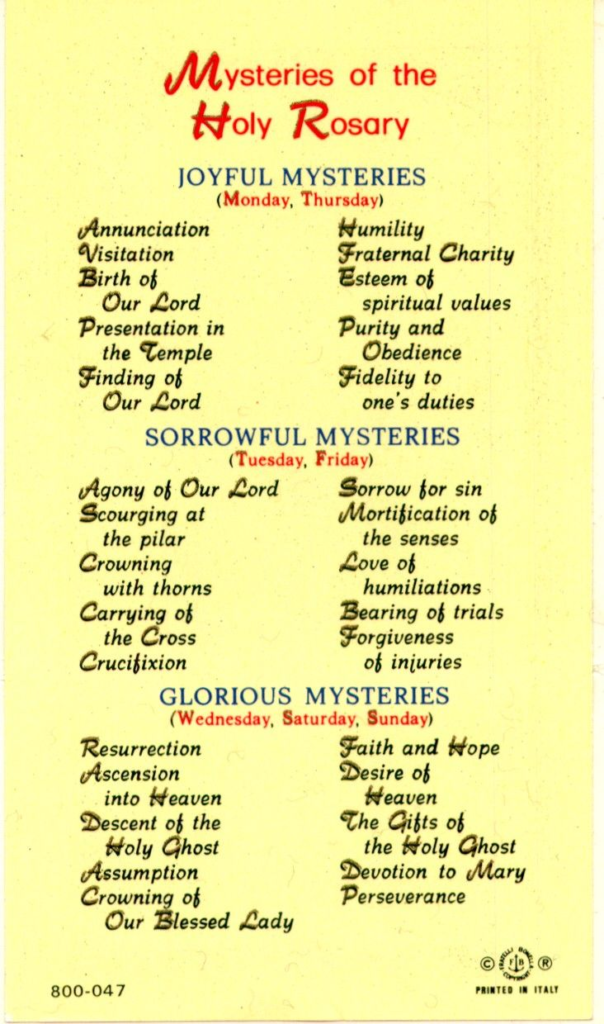

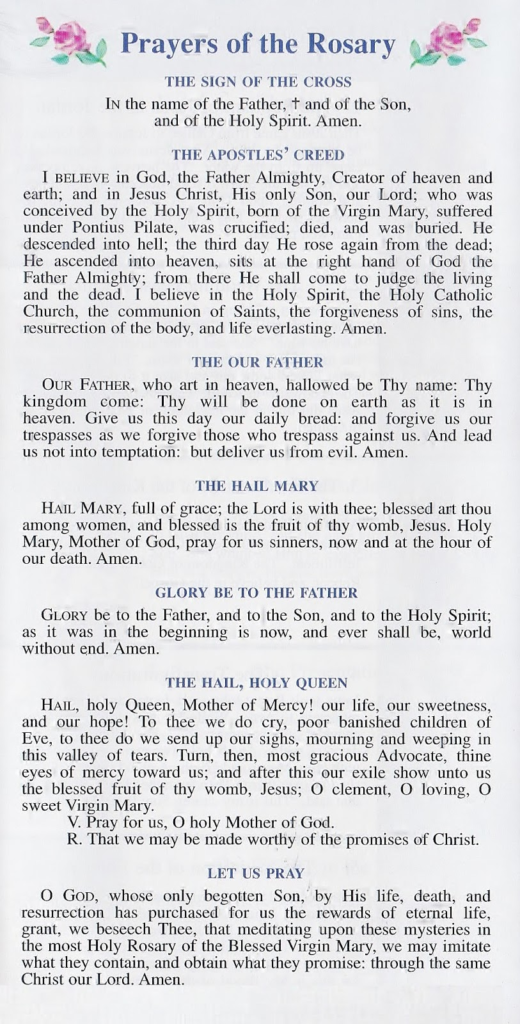
O my Jesus, forgive us our sins, save us from the fires of hell, and lead all souls to heaven, especially those most in need of Thy mercy.
_________________________________________________________________________________
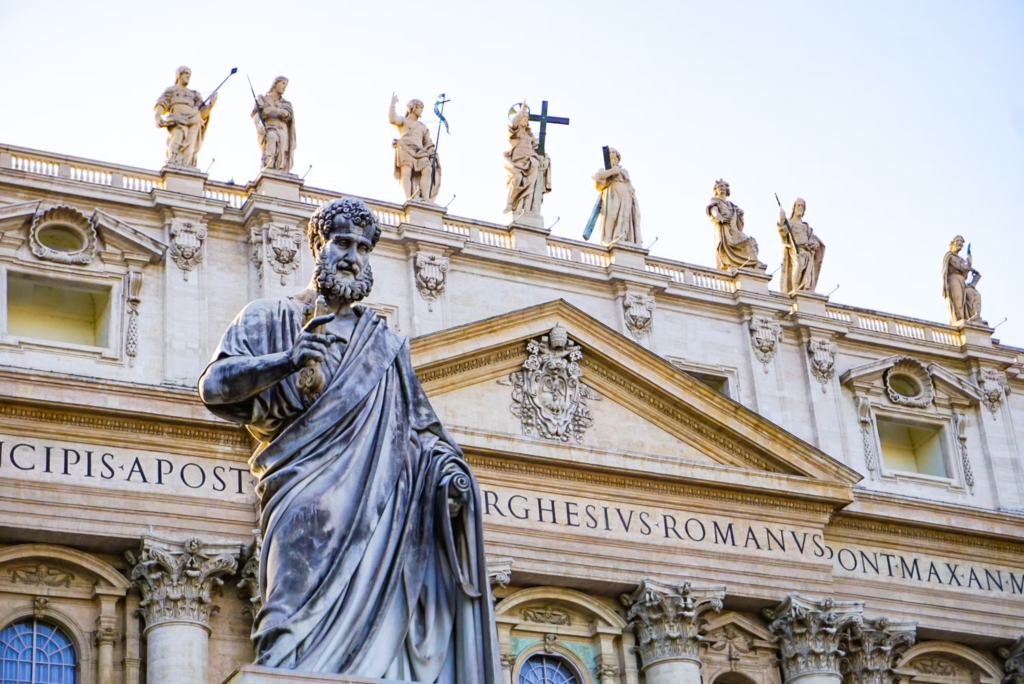
One Lord, one faith, one baptism. ~Eph. 4: 5
INSTRUCTION ON THE ONE ONLY SAVING FAITH
These words of the great Apostle of the Gentiles show clearly, that it is not a matter of indifference, whether this or that faith, this or that religion is professed. Yet in our times, poor in faith, we so often hear the assertion from so called enlightened men: “It is all the same to what religion we belong, we can be saved in any one, if we only believe in God and live uprightly.” How impious is this assertion! Consider, my dear Christian, there is but one God, and this one God has sent only one Redeemer, and this one Redeemer has preached only one doctrine and established one Church. Had God wished that there should be more than one Church, then Jesus should have said so, He should have founded several Churches, nay, He should not have preached a new doctrine, founded a new Christian Church; for the Jews also believed in one God. But Jesus cast aside heathenism and Judaism, preached only one and, indeed, a new religion, founded only one Church. Nowhere does He speak of Churches, but always of one Church. He says that we must hear this Church, and does not add, that if we will not hear this Church, we may hear some other one. He speaks of only one shepherd, one flock, and one fold, into which all men are to be brought.
In the same manner He speaks always of one kingdom of God on earth, just as there is only one kingdom of heaven; of only one master of the house and one family, of one field and one vineyard, whereby He understood His Church; of only one rock, upon which He would build His Church. On the day before His death, He prayed fervently to His Heavenly Father, that all who believe in Him, might be and remain one, as He and the Father are one, and He also gave His disciples the express command to preach His gospel to all nations, and to teach them all things, whatsoever He had commanded them. This command the apostles carried out exactly. Everywhere they preached one and the same doctrine, founded, indeed, in all places, Christian communities, but which were united by the bond of the same faith. It was one of the principal cares of the apostles to prevent schisms in faith, they warned from heresy, commanded all originators of such to be avoided, and anathematised those who preached a gospel different from theirs. As the apostles so their successors.** All the holy fathers speak with burning love of the necessary unity of faith, and deny those, who remain knowingly in schism and separation from the true Church of Jesus, all claim to salvation.
Learn from this, therefore, my dear Christian, that there can be but one true Church; but if there is but one true Church, it naturally follows, that in her alone salvation can be obtained, and the assertion, that we can be saved in any creed, is false and impious. Jesus who is the Way, the Truth, and the Life, speaks of only one Church, which we must hear, if we wish to be saved. He who does not hear the Church, He says, should be considered as a heathen and publican. He speaks furthermore of one fold, and He promises eternal life only to those sheep who belong to this fold, obey the voice of the one shepherd and feed in His pasture. The apostles were also convinced, that only the one, true Church makes salvation certain. Without faith it is impossible to please God, writes St. Paul to the Hebrews (6: 6), and this faith is only one, he teaches the Ephesians (4: 5). If the apostles had believed, that any religion can save man, they would certainly not have contended so strenuously for unity, they would not have declared so solemnly, that we cannot belong to any other than to Christ alone, and that we must receive and obey His doctrine. As the apostles their successors and all the fathers agree, that there is no salvation outside of the true Church.
St. Cyprian writes: “If any one outside Noah’s ark could find safety, then also will one outside the Church find it.” (De unit, eccl. c. 7.) From all this it follows, that there is only one true Church which gives salvation, outside of which there can be no salvation.
But which is this Church? Certainly only the Roman-Catholic, Apostolic Church, for she alone is founded by Christ, she alone is watered with the blood of the apostles and so many thousands of holy martyrs, she alone has the marks of the true Church of Jesus, to which He has promised, that she shall, notwithstanding all the attacks of her enemies, stand to the end of the world. Those who fell away from the Church three hundred years ago, do, indeed, contend that the Church fell into error and no longer possessed the true, pure gospel of Jesus. Were they right, Jesus were to be blamed, for He founded this Church, He promised to remain with her and guide her through the Holy Ghost until the end of the world. He would, therefore, have broken His word, or He was not powerful enough to keep it. But who will say this? On the contrary, she has existed for [two thousand] years, whilst the greatest and most powerful kingdoms have been mined (removed), and the firmest thrones crumbled away. If she were not the only true and saving Church, founded by Christ, how could she have existed so long, since Jesus said, that every plant that His Heavenly Father has not planted, shall be rooted up? (Matt. 15: 13). If she were not the Church of Christ, long ago would she be destroyed, but she still stands today, whilst her enemies who battled with her, have disappeared and shall disappear; for the gates of hell shall not prevail against her, says our Lord, and He has kept His word and will keep it, notwithstanding all the oppositions and calumnies of her implacable enemies.
You see, therefore, my dear Christian, that the Catholic Church is the only true and the only saving Church; do not let yourself be deceived by those who are neither cold nor warm, and who use these words: “We can be saved in any religion, if we only believe in God and live uprightly,” and who wish to rob you of your holy faith, and precipitate you into the sea of doubt, error, and falsehood. Outside of the Catholic Church there is no salvation; this hold firmly, for it is the teaching of Jesus, His apostles, and all the fathers; for this doctrine the apostles and a countless host of the faithful have shed their blood; but obey the teaching of this Church, follow her laws, make use of her help and assistance, and often raise your hands and heart to heaven to thank God for the priceless grace of belonging to this one, true Church; forget not to pray for your erring brethren, who are still outside of the Church, that the Lord may lead them into her, that His promise may be fulfilled: There will be one fold and one shepherd.
~ Commentary by the Father Leonard Goffine, 1871.
_________________________________________________________________________________
The Holy & Blessed Trinity

Baltimore Catechism #3
LESSON 3: ON THE UNITY AND TRINITY OF GOD
Q. 180. What does “unity,” and what does “trinity” mean?
A. “Unity” means being one, and “trinity” means three-fold or three in one.
Q. 181. Can we find an example to fully illustrate the mystery of the Blessed Trinity?
A. We cannot find an example to fully illustrate the mystery of the Blessed Trinity, because the mysteries of our holy religion are beyond comparison.
Q. 182. Is there but one God?
A. Yes; there is but one God.
Q. 183. Why can there be but one God?
A. There can be but one God because God, being supreme and infinite, cannot have an equal.
Q. 184. What does “supreme” mean?
A. “Supreme” means the highest in authority; also the most excellent or greatest possible in anything. Thus in all things God is supreme, and in the Church the Pope is supreme.
Q. 185. When are two persons said to be equal?
A. Two persons are said to be equal when one is in no way greater than or inferior to the other.
Q. 186. How many persons are there in God?
A. In God there are three Divine persons, really distinct, and equal in all things –the Father, the Son, and the Holy Ghost.
Q. 187. What do “divine” and “distinct” mean?
A. “Divine” means pertaining to God, and “distinct” means separate; that is, not confounded or mixed with any other thing.
Q. 188. Is the Father God?
A. The Father is God and the first Person of the Blessed Trinity.
Q. 189. Is the Son God?
A. The Son is God and the second Person of the Blessed Trinity.
Q. 190. Is the Holy Ghost God?
A. The Holy Ghost is God and the third Person of the Blessed Trinity.
Q. 191. Do “first,” “second,” and “third” with regard to the persons of the Blessed Trinity mean that one person existed before the other or that one is greater than the other?
A. “First,” “second,” and “third” with regard to the persons of the Blessed Trinity do not mean that one person was before the other or that one is greater than the other; for all the persons of the Trinity are eternal and equal in every respect. These numbers are used to mark the distinction between the persons, and they show the order in which the one proceeded from the other.

Q. 192. What do you mean by the Blessed Trinity?
A. By the Blessed Trinity I mean one God in three Divine Persons.
Q. 193. Are the three Divine Persons equal in all things?
A. The three Divine Persons are equal in all things.
Q. 194. Are the three Divine Persons one and the same God?
A. The three Divine Persons are one and the same God, having one and the same Divine nature and substance.
Q. 195. What do we mean by the “nature” and “substance” of a thing?
A. By the “nature” of a thing we mean the combination of all the qualities that make the thing what it is. By the “substance” of a thing we mean the part that never changes, and which cannot be changed without destroying the nature of the thing.
Q. 196. Can we fully understand how the three Divine Persons are one and the same God?
A. We cannot fully understand how the three Divine Persons are one and the same God, because this is a mystery.
Q. 197. What is a mystery?
A. A mystery is a truth which we cannot fully understand.
Q. 198. Is every truth which we cannot understand a mystery?
A. Every truth which we cannot understand is not a mystery; but every revealed truth which no one can understand is a mystery.
Q. 199. Should we believe truths which we cannot understand?
A. We should and often do believe truths which we cannot understand when we have proof of their existence.
Q. 200. Give an example of truths which all believe, though many do not understand them.
A. All believe that a seed planted in the ground will produce a flower or tree often with more than a thousand other seeds equal to itself, though many cannot understand how this is done.
Q. 201. Why must a divine religion have mysteries?
A. A divine religion must have mysteries because it must have supernatural truths and God Himself must teach them. A religion that has only natural truths, such as man can know by reason alone, fully understand and teach, is only a human religion.
Q. 202. Why does God require us to believe mysteries?
A. God requires us to believe mysteries that we may submit our understanding to Him.
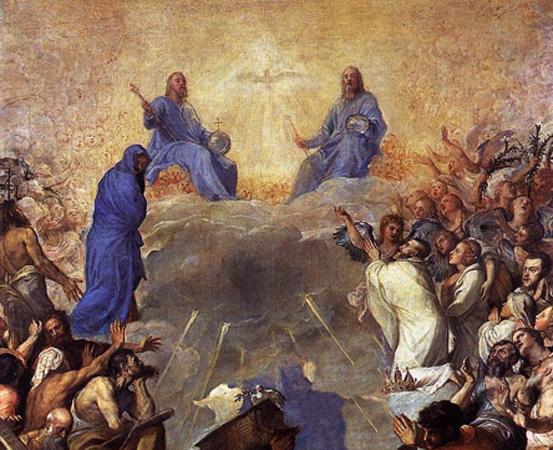
Q. 203. By what form of prayer do we praise the Holy Trinity?
A. We praise the Holy Trinity by a form of prayer called the Doxology, which has come down to us almost from the time of the Apostles.
Q. 204. Say the Doxology.
A. The Doxology is: “Glory be to the Father, and to the Son, and to the Holy Ghost. As it was in the beginning, is now, and ever shall be, world without end. Amen.”
Q. 205. Is there any other form of the Doxology?
A. There is another form of the Doxology, which is said in the celebration of the Mass. It is called the “Gloria in excelsis” or “Glory be to God on high,” etc., the words sung by the Angels at the birth of Our Lord.
_____________________________________________________________________
The Holy & Blessed Eucharist
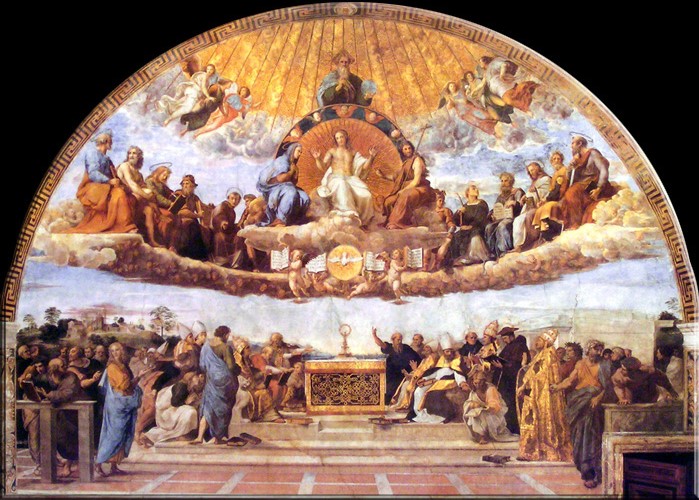
Baltimore Catechism #3
LESSON 22: ON THE HOLY EUCHARIST
Q. 869. What does the word Eucharist strictly mean?
A. The word Eucharist strictly means pleasing, and this Sacrament is so called because it renders us most pleasing to God by the grace it imparts, and it gives us the best means of thanking Him for all His blessings.
Q. 870. What is the Holy Eucharist?
A. The Holy Eucharist is the Sacrament which contains the body and blood, soul and divinity, of our Lord Jesus Christ under the appearances of bread and wine.
Q. 871. What do we mean when we say the Sacrament which contains the Body and Blood?
A. When we say the Sacrament which contains the Body and Blood, we mean the Sacrament which is the Body and Blood, for after the Consecration there is no other substance present in the Eucharist.
Q. 872. When is the Holy Eucharist a Sacrament, and when is it a sacrifice?
A. The Holy Eucharist is a Sacrament when we receive it in Holy Communion and when it remains in the Tabernacle of the Altar. It is a sacrifice when it is offered up at Mass by the separate Consecration of the bread and wine, which signifies the separation of Our Lord’s blood from His body when He died on the Cross.
Q. 873. When did Christ institute the Holy Eucharist?
A. Christ instituted the Holy Eucharist at the Last Supper, the night before He died.
Q. 874. Who were present when our Lord instituted the Holy Eucharist?
A. When Our Lord instituted the Holy Eucharist, the twelve Apostles were present.
Q. 875. How did our Lord institute the Holy Eucharist?
A. Our Lord instituted the Holy Eucharist by taking bread, blessing, breaking, and giving to His Apostles, saying: “Take ye and eat. This is my body”; and then, by taking the cup of wine, blessing and giving it, saying to them: “Drink ye all of this. This is my blood which shall be shed for the remission of sins. Do this for a commemoration of me.”
Q. 876. What happened when our Lord said, “This is my body; this is my blood”?
A. When Our Lord said, “This is my body,” the substance of the bread was changed into the substance of His body; when He said, “This is my blood,” the substance of the wine was changed into the substance of His blood.
Q. 877. How do we prove the Real Presence, that is, that Our Lord is really and truly present in the Holy Eucharist?
A. We prove the Real Presence — that is, that Our Lord is really and truly present in the Holy Eucharist:
1. By showing that it is possible to change one substance into another;
2. By showing that Christ did change the substance of bread and wine into the substance of His body and blood;
3. By showing that He gave this power also to His Apostles and to the priests of His Church.
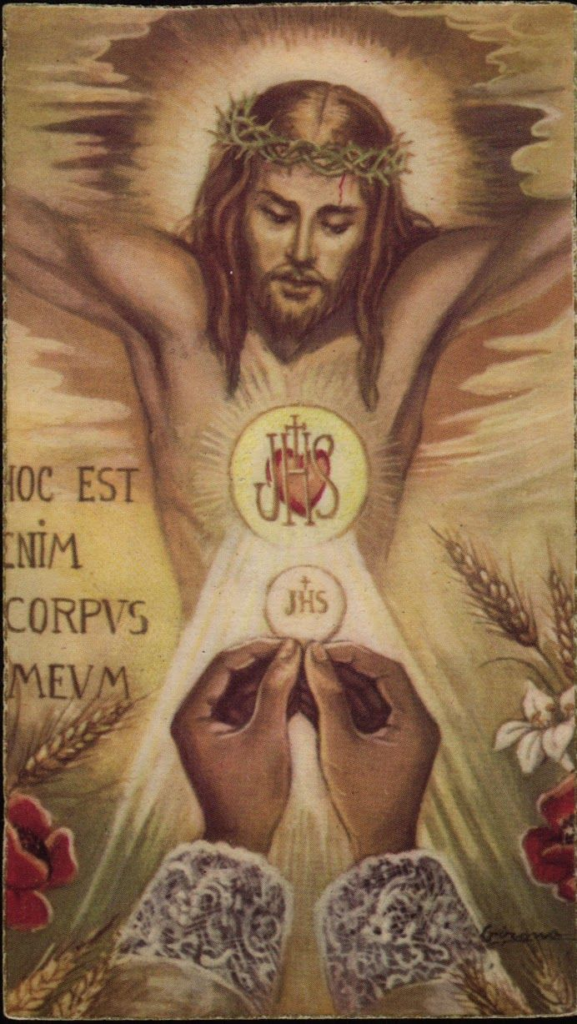
Q. 878. How do we know that it is possible to change one substance into another?
A. We know that it is possible to change one substance into another, because:
1. God changed water into blood during the plagues of Egypt.
2. Christ changed water into wine at the marriage of Cana.
3. Our own food is daily changed into the substance of our flesh and blood; and what God does gradually, He can also do instantly by an act of His will.
Q. 879. Are these changes exactly the same as the changes that take place in the Holy Eucharist?
A. These changes are not exactly the same as the changes that take place in the Holy Eucharist, for in these changes the appearance also is changed, but in the Holy Eucharist only the substance is changed while the appearance remains the same.
Q. 880. How do we show that Christ did change bread and wine into the substance of His body and blood?
A. We show that Christ did change bread and wine into the substance of His body and blood:
1. From the words by which He promised the Holy Eucharist;
2. From the words by which He instituted the Holy Eucharist;
3. From the constant use of the Holy Eucharist in the Church since the time of the Apostles;
4. From the impossibility of denying the Real Presence in the Holy Eucharist, without likewise denying all that Christ has taught and done; for we have stronger proofs for the Holy Eucharist than for any other Christian truth.
Q. 881. Is Jesus Christ whole and entire both under the form of bread and under the form of wine?
A. Jesus Christ is whole and entire both under the form of bread and under the form of wine.
Q. 882. How do we know that under the appearance of bread we receive also Christ’s blood; and under the appearance of wine we receive also Christ’s body?
A. We know that under the appearance of bread we receive also Christ’s blood, and under the appearance of wine we receive also Christ’s body; because in the Holy Eucharist we receive the living body of Our Lord, and a living body cannot exist without blood, nor can living blood exist without a body.
Q. 883. Is Jesus Christ present whole and entire in the smallest portion of the Holy Eucharist, under the form of either bread or wine?
A. Jesus Christ is present whole and entire in the smallest portion of the Holy Eucharist under the form of either bread or wine; for His body in the Eucharist is in a glorified state, and as it partakes of the character of a spiritual substance, it requires no definite size or shape.
Q. 884. Did anything remain of the bread and wine after their substance had been changed into the substance of the body and blood of our Lord?
A. After the substance of the bread and wine had been changed into the substance of the body and blood of Our Lord, there remained only the appearances of bread and wine.
Q. 885. What do you mean by the appearances of bread and wine?
A. By the appearances of bread and wine I mean the figure, the color, the taste, and whatever appears to the senses.
Q. 886. What is this change of the bread and wine into the body and blood of our Lord called?
A. This change of the bread and wine into the body and blood of Our Lord is called Transubstantiation.
Q. 887. What is the second great miracle in the Holy Eucharist?
A. The second great miracle in the Holy Eucharist is the multiplication of the presence of Our Lord’s body in so many places at the same time, while the body itself is not multiplied — for there is but one body of Christ.
Q. 888. Are there not, then, as many bodies of Christ as there are tabernacles in the world, or as there are Masses being said at the same time?
A. There are not as many bodies of Christ as there are tabernacles in the world, or as there are Masses being said at the same time; but only one body of Christ, which is everywhere present whole and entire in the Holy Eucharist, as God is everywhere present, while He is but one God.
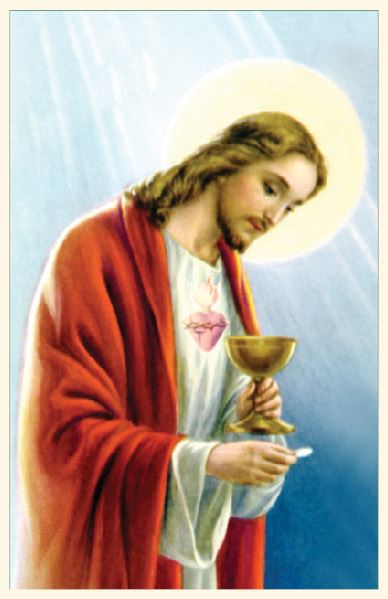
Q. 889. How was the substance of the bread and wine changed into the substance of the body and blood of Christ?
A. The substance of the bread and wine was changed into the substance of the body and blood of Christ by His almighty power.
Q. 890. Does this change of bread and wine into the body and blood of Christ continue to be made in the Church?
A. This change of bread and wine into the body and blood of Christ continues to be made in the Church by Jesus Christ through the ministry of His priests.
Q. 891. When did Christ give His priests the power to change bread and wine into His body and blood?
A. Christ gave His priests the power to change bread and wine into His body and blood when He said to the Apostles, “Do this in commemoration of Me.”
Q. 892. What do the words “Do this in commemoration of Me” mean?
A. The words “Do this in commemoration of Me” mean: Do what I, Christ, am doing at My last supper, namely, changing the substance of bread and wine into the substance of My body and blood; and do it in remembrance of Me.
Q. 893. How do the priests exercise this power of changing bread and wine into the body and blood of Christ?
A. The priests exercise this power of changing bread and wine into the body and blood of Christ through the words of consecration in the Mass, which are words of Christ: “This is my body; this is my blood.”
Q. 894. At what part of the Mass does the Consecration take place?
A. The Consecration in the Mass takes place immediately before the elevation of the Host and Chalice, which are raised above the head of the priest that the people may adore Our Lord who has just come to the altar at the words of Consecration.
_____________________________________________________________________
The Holy Sacrifice of the Mass
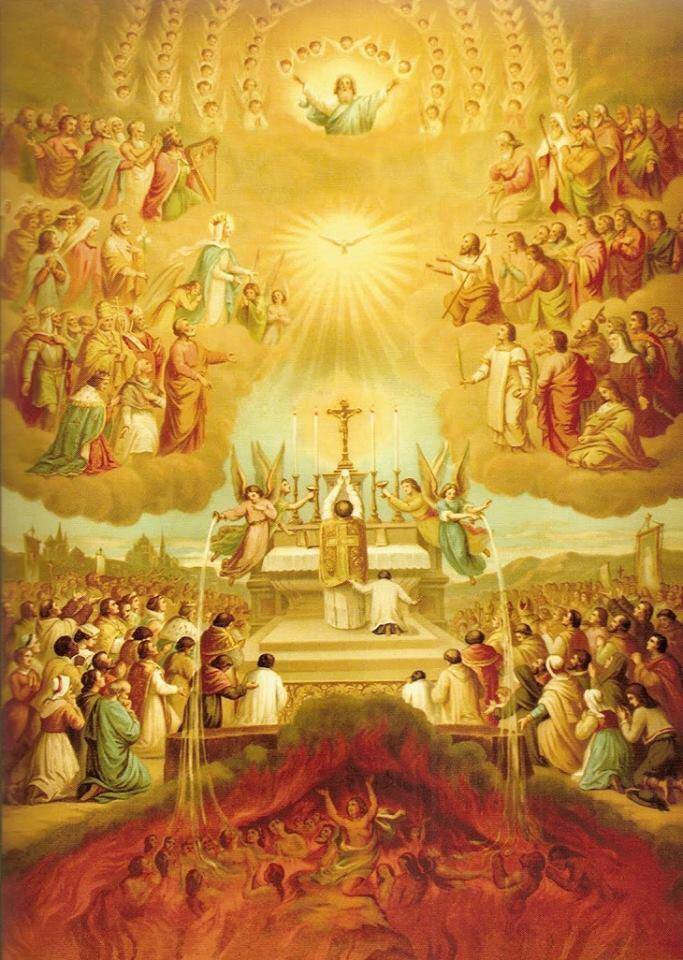
Baltimore Catechism #3
LESSON 24: ON THE HOLY SACRIFICE OF THE MASS
Q. 916. When and where are the bread and wine changed into the body and blood of Christ?
A. The bread and wine are changed into the body and blood of Christ at the Consecration in the Mass.
Q. 917. What is the Mass?
A. The Mass is the unbloody sacrifice of the body and blood of Christ.
Q. 918. Why is this Sacrifice called the Mass?
A. This Sacrifice is called the “Mass” very probably from the words “Ite Missa est,” used by the priest as he tells the people to depart when the Holy Sacrifice is ended.
Q. 919. What is a sacrifice?
A. A sacrifice is the offering of an object by a priest to God alone, and the consuming of it to acknowledge that He is the Creator and Lord of all things.
Q. 920. Is the Mass the same sacrifice as that of the Cross?
A. The Mass is the same sacrifice as that of the Cross.
Q. 921. How is the Mass the same sacrifice as that of the Cross?
A. The Mass is the same sacrifice as that of the Cross because the offering and the priest are the same — Christ our Blessed Lord; and the ends for which the sacrifice of the Mass is offered are the same as those of the sacrifice of the Cross.
Q. 922. What were the ends for which the sacrifice of the Cross was offered?
A. The ends for which the sacrifice of the Cross was offered were:
1. To honour and glorify God;
2. To thank Him for all the graces bestowed on the whole world;
3. To satisfy God’s justice for the sins of men;
4. To obtain all graces and blessings.

Q. 923. How are the fruits of the Mass distributed?
A. The fruits of the Mass are distributed thus:
1. The first benefit is bestowed on the priest who says the Mass;
2. The second on the person for whom the Mass is said, or for the intention for which it is said;
3. The third on those who are present at the Mass, and particularly on those who serve it, and
4. The fourth on all the faithful who are in communion with the Church.
Q. 924. Are all Masses of equal value in themselves or do they differ in worth?
A. All Masses are equal in value in themselves and do not differ in worth, but only in the solemnity with which they are celebrated or in the end for which they are offered.
Q. 925. How are Masses distinguished?
A. Masses are distinguished thus:
1. When the Mass is sung by a bishop, assisted by a deacon and sub-deacon, it is called a Pontifical Mass;
2. When it is sung by a priest, assisted by a deacon and sub-deacon, it is called a Solemn Mass;
3. When sung by a priest without deacon and sub-deacon, it is called a Missa Cantata or High Mass;
4. When the Mass is only read in a low tone it is called a low or private Mass.
Q. 926. For what end or intention may Mass be offered?
A. Mass may be offered for any end or intention that tends to the honour and glory of God, to the good of the Church or the welfare of man; but never for any object that is bad in itself, or in its aims; neither can it be offered publicly for persons who are not members of the true Church.
Q. 927. Explain what is meant by Requiem, Nuptial and Votive Masses.
A. A Requiem Mass is one said in black vestments and with special prayers for the dead. A Nuptial Mass is one said at the marriage of two Catholics, and it has special prayers for their benefit. A Votive Mass is one said in honour of some particular mystery or saint, on a day not set apart by the Church for the honour of that mystery or saint.
Q. 928. From what may we learn that we are to offer up the Holy Sacrifice with the priest?
A. We may learn that we are to offer up the Holy Sacrifice with the priest from the words used in the Mass itself; for the priest, after offering up the bread and wine for the Sacrifice, turns to the people and says: “Orate Fratres,” etc., which means: “Pray, brethren, that my sacrifice and yours may be acceptable to God the Father Almighty,” and the server answers in our name: “May the Lord receive the sacrifice from thy hands to the praise and glory of His own name, and to our benefit and that of all His Holy Church.”
Q. 929. From what did the custom of making an offering to the priest for saying Mass arise?
A. The custom of making an offering to the priest for saying Mass arose from the old custom of bringing to the priest the bread and wine necessary for the celebration of Mass.
Q. 930. Is it not simony, or the buying of a sacred thing, to offer the priest money for saying Mass for your intention?
A. It is not simony, or the buying of a sacred thing, to offer the priest money for saying Mass for our intention, because the priest does not take the money for the Mass itself, but for the purpose of supplying the things necessary for Mass and for his own support.
Q. 931. Is there any difference between the sacrifice of the Cross and the sacrifice of the Mass?
A. Yes; the manner in which the sacrifice is offered is different. On the Cross Christ really shed His blood and was really slain; in the Mass there is no real shedding of blood nor real death, because Christ can die no more; but the sacrifice of the Mass, through the separate consecration of the bread and the wine, represents His death on the Cross.
Q. 932. What are the chief parts of the Mass?
A. The chief parts of the Mass are:
1. The Offertory, at which the priests offers to God the bread and wine to be changed at the Consecration;
2. The Consecration, at which the substance of the bread and wine are changed into the substance of Christ’s body and blood;
3. The Communion, at which the priest receives into his own body the Holy Eucharist under the appearance of both bread and wine.
Q. 933. At what part of the Mass does the Offertory take place, and what parts of the Mass are said before it?
A. The Offertory takes place immediately after the uncovering of the chalice. The parts of the Mass said before it are: The Introit, Kyrie, Gloria, Prayers, Epistle, Gospel and Creed. The Introit, Prayers, Epistle and Gospel change in each Mass to correspond with the feast celebrated.
Q. 934. What is the part of the Mass called in which the Words of Consecration are found?
A. The part of the Mass in which the words of Consecration are found is called the Canon. This is the most solemn part of the Mass, and is rarely but slightly changed in any Mass.
Q. 935. What follows the Communion of the Mass?
A. Following the Communion of Mass, there are prayers of thanksgiving, the blessing of the people, and the saying of the last Gospel.
Q. 936. What things are necessary for Mass?
A. The things necessary for Mass are:
1. An altar with linen covers, candles, crucifix, altar stone and Mass book;
2. A Chalice with all needed in its use, and bread of flour from wheat and wine from the grape;
3. Vestments for the priest, and
4. An acolyte or server.
Q. 937. What is the altar stone, and of what does it remind us?
A. The altar stone is that part of the altar upon which the priest rests the Chalice during Mass. This stone contains some holy relics sealed up in it by the bishop, and if the altar is of wood this stone is inserted just in front of the Tabernacle. The altar stone reminds us of the early history of the Church, when the martyrs’ tombs were used for altars by the persecuted Christians.
Q. 938. What lesson do we learn from the practice of using martyrs’ tombs for altars?
A. From the practice of using martyrs’ tombs for altars we learn the inconvenience, sufferings and dangers the early Christians willingly underwent for the sake of hearing Mass. Since the Mass is the same now as it was then, we should suffer every inconvenience rather than be absent from Mass on Sundays or holy days.
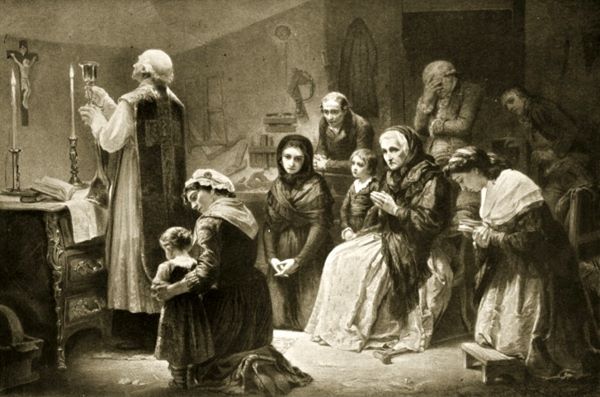
Q. 939. What things are used with the chalice during Mass?
A. The things used with the chalice during Mass are:
1. The purificator or cloth for wiping the inside;
2. The paten or small silver plate used in handling the host;
3. The pall or white card used for covering the chalice at Mass;
4. The corporal or linen cloth on which the chalice and host rest.
Q. 940. What is the host?
A. The host is the name given to the thin wafer of bread used at Mass. This name is generally applied before and after Consecration to the large particle of bread used by the priest, though the small particles given to the people are also called by the same name.
Q. 941. Are large and small hosts consecrated at every Mass?
A. A large host is consecrated at every Mass, but small hosts are consecrated only at some Masses at which they are to be given to the people or placed in the Tabernacle for the Holy Communion of the faithful.
Q. 942. What vestments does the priest use at Mass and what do they signify?
A. The vestments used by the priest at Mass are:
1. The Amice, a white cloth around the shoulders to signify resistance to temptation;
2. The Alb, a long white garment to signify innocence;
3. The Cincture, a cord about the waist, to signify chastity;
4. The Maniple or hanging vestment on the left arm, to signify penance;
5. The Stole or long vestment about the neck, to signify immortality;
6. The Chasuble or long vestment over all, to signify love and remind the priest, by its cross on front and back, of the Passion of Our Lord.
Q. 943. How many colours of vestments are used, and what do the colours signify?
A. Five colors of vestments are used, namely, white, red, green, violet or purple, and black. White signifies innocence and is used on the feasts of Our Blessed Lord, of the Blessed Virgin, and of some saints. Red signifies love, and is used on the feasts of the Holy Ghost, and of martyrs. Green signifies hope, and is generally used on Sundays from Epiphany to Pentecost. Violet signifies penance, and is used in Lent and Advent. Black signifies sorrow, and is used on Good Friday and at Masses for the dead. Gold is often used for white on great feasts.
Q. 944. What is the Tabernacle and what is the Ciborium?
A. The Tabernacle is the house-shaped part of the altar where the sacred vessels containing the Blessed Sacrament are kept. The Ciborium is the large silver or gold vessel which contains the Blessed Sacrament while in the Tabernacle, and from which the priest gives Holy Communion to the people.
Q. 945. What is the Ostensorium or Monstrance?
A. The Ostensorium or Monstrance is the beautiful wheel-like vessel in which the Blessed Sacrament is exposed and kept during the Benediction.
Q. 946. How should we assist at Mass?
A. We should assist at Mass with great interior recollection and piety and with every outward mark of respect and devotion.
Q. 947. Which is the best manner of hearing Mass?
A. The best manner of hearing Mass is to offer it to God with the priest for the same purpose for which it is said, to meditate on Christ’s sufferings and death, and to go to Holy Communion.
Q. 948. What is important for the proper and respectful hearing of Mass?
A. For the proper and respectful hearing of Mass it is important to be in our place before the priest comes to the altar and not to leave it before the priest leaves the altar. Thus we prevent the confusion and distraction caused by late coming and too early leaving. Standing in the doorways, blocking up passages and disputing about places should, out of respect for the Holy Sacrifice, be most carefully avoided.
Q. 949. What is Benediction of the Blessed Sacrament, and what vestments are used at it?
A. Benediction of the Blessed Sacrament is an act of divine worship in which the Blessed Sacrament, placed in the ostensorium, is exposed for the adoration of the people and is lifted up to bless them. The vestments used at Benediction are: A cope or large silk cloak and a humeral or shoulder veil.
***********

